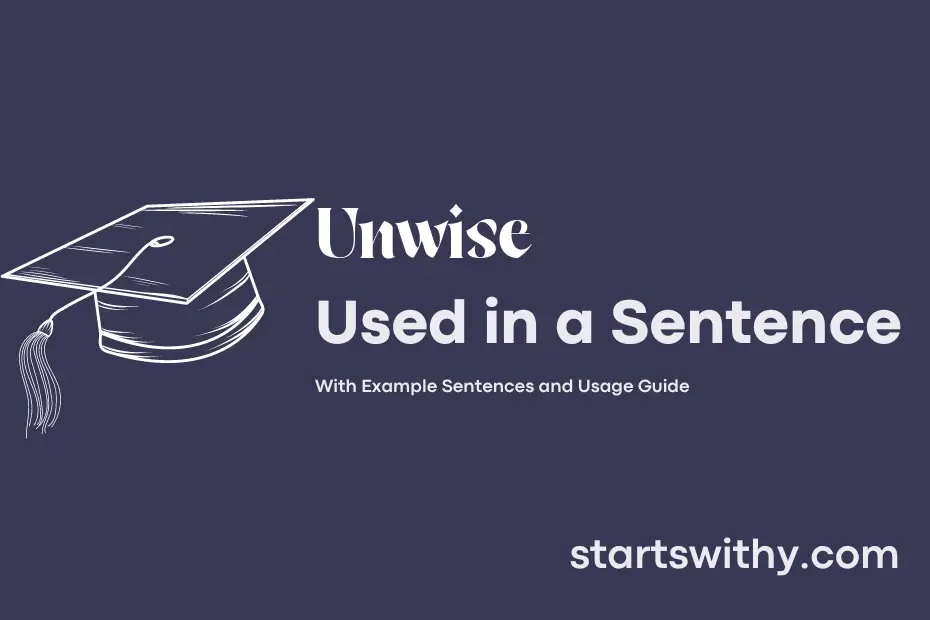Have you ever wondered what it means to be considered “unwise”? The term “unwise” typically refers to actions or decisions that lack good judgment, foresight, or prudence.
When someone is described as “unwise,” it often implies that they are making choices that are not sensible or beneficial in the long run. This can range from simple everyday decisions to more significant life choices that could have negative consequences.
7 Examples Of Unwise Used In a Sentence For Kids
- Eating too much candy before dinner is unwise.
- Not wearing a sweater in cold weather is unwise.
- Running near a swimming pool is unwise.
- Talking to strangers without telling your parents is unwise.
- Playing with matches is unwise.
- Not washing your hands before eating is unwise.
- Not looking both ways before crossing the street is unwise.
14 Sentences with Unwise Examples
- It would be unwise to skip attending classes regularly if you want to excel in your academics.
- Submitting assignments at the last minute is considered unwise as it can affect the quality of your work.
- It is unwise to procrastinate studying for exams until the last moment as it can lead to panic and stress.
- Spending all your money on unnecessary items is unwise when you need to budget for essential college expenses.
- It would be unwise to plagiarize someone else’s work as it can result in severe consequences like academic probation or expulsion.
- Choosing a major purely for the sake of pleasing your parents would be unwise if your interests lie elsewhere.
- Signing up for too many extracurricular activities can be unwise if it hinders your ability to focus on your studies.
- Staying up all night before an exam is inherently unwise as it can impair your cognitive abilities and affect your performance.
- Engaging in risky behavior at parties, such as binge drinking or drug use, is unwise and can have serious consequences for your health and academic standing.
- Ignoring mental health concerns and not seeking help when needed is unwise as it can have a detrimental impact on your overall well-being.
- It is unwise to underestimate the importance of networking and building connections with professors and peers during your college years.
- Accepting a high-interest credit card offer without understanding the terms and conditions would be unwise and could lead to financial troubles in the future.
- Skipping meals or relying on unhealthy fast food options due to a busy schedule is unwise as it can negatively impact your physical and mental health.
- Not taking advantage of opportunities for internships or research experiences during college is unwise as it can limit your career prospects after graduation.
How To Use Unwise in Sentences?
To use the word “Unwise” in a sentence, beginners should keep in mind its meaning as an adjective that describes a choice or decision that is not sensible or prudent. To incorporate this word effectively into a sentence, follow these steps:
- Choose a situation where someone is making a decision that may not be wise or well-considered. For example, “It was unwise to go hiking alone in the dark forest.”
- Identify the subject of the sentence, which is the person or thing that the sentence is about. In the example sentence, the subject is “It.”
- Place the word unwise before the verb in the sentence to emphasize the lack of wisdom in the action being described. For instance, “It was unwise to ignore the weather warnings before heading out.”
- Make sure the sentence is grammatically correct and conveys the intended meaning clearly. Avoiding any confusion or ambiguity will help the reader understand the significance of using the word unwise in that specific context.
By following these steps, beginners can effectively incorporate the word unwise into their sentences to communicate the idea of a poor or imprudent choice being made. Practicing with different scenarios and contexts will help expand vocabulary and improve overall writing skills.
Conclusion
In conclusion, the examples of sentences with “unwise” highlight actions or decisions that are not prudent or sensible. These statements underscore the potential consequences of making unwise choices in various situations, including personal, financial, or professional matters. It is evident that being cautious and thoughtful in decision-making can help avoid unfavorable outcomes and ensure better long-term results.
Ultimately, the examples of sentences with “unwise” serve as a reminder of the importance of critical thinking and foresight when faced with difficult choices. By learning from these situations and considering the potential repercussions of our decisions, we can strive to make wiser choices that lead to more positive and successful outcomes.



